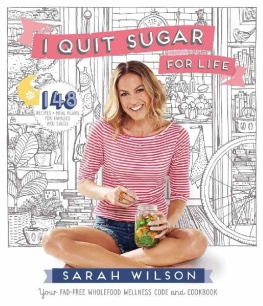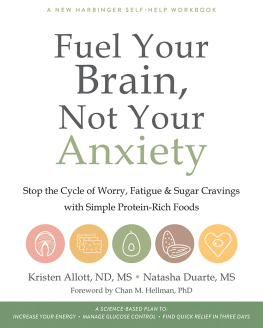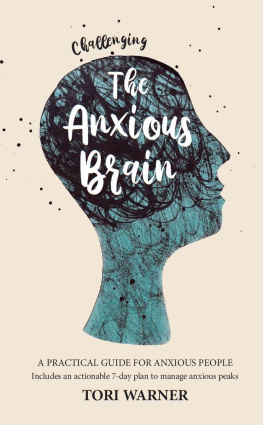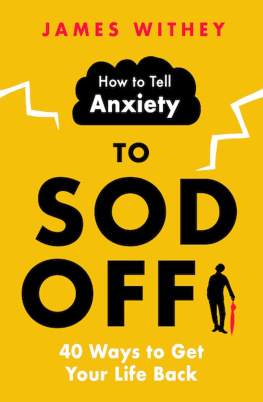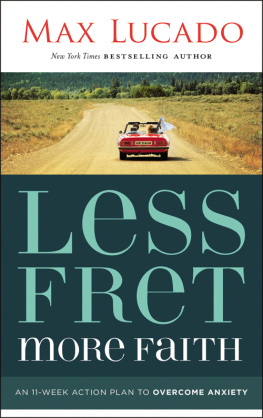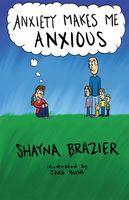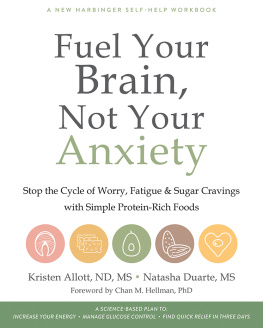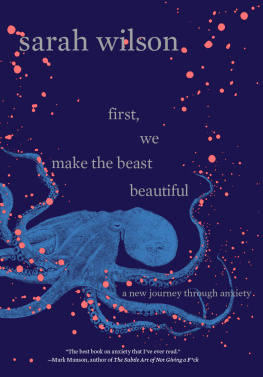Contents
Living in the Age of Anxiety
Why are we all so anxious? And why are more of us living with anxiety now than ever before? Were told that, globally, one in thirteen people suffers from an anxiety-related illness. Some studies reveal that one in six Westerners will be afflicted with an anxiety disorder at some stage in our lives, making it the most common officially classified mental illness. And there is no accurate way to measure how many of us are living in a highly agitated state but dont have a diagnosed disorder. There are many competing theories as to why collective anxiety is on the rise, but the most recent and compelling science suggests that anxiety is not merely a chemical imbalance in the brain, as weve been told for two decades, but that it is also a result of inflammation and imbalances in the gut.
If we cut to the chase, this means that anxiety has a lot to do with our lifestyle choices, particularly what were putting in our mouths.
This news has big implications for all of us who dance daily with anxiety in its various guises. Mostly, it means that the fix for anxiety might not (only) be medication or therapy. Reducing your anxiety could be as easy as embracing a few simple and sensible dietary and lifestyle changes.
This is good news. It truly is. It puts the power back into your hands (and anyone with anxiety knows how powerless it can leave you feeling).
Lets backtrack a bit. I learned all this firsthand, the hard and, I guess you could say, authentic way. Ive had anxiety all my life. It has coexisted with a number of related autoimmune diseases, most significantly Hashimotos disease, a condition mostly affecting women over age forty in which the immune system attacks the thyroid.
Many of you reading this might also have an autoimmune disease like Hashimotos. Thats not surprising. Autoimmune diseases often go hand in hand with anxiety.
In January 2011, my anxiety and Hashimotos were raging to a point where I was unable to work, or even walk, for nine months. For years, specialists and nutritionists had been telling me to give up sugarsugar flares Hashimotos terribly, and some even argue that it causes the disorder in the first place. But I was addicted and had convinced myself that the sugars I was eating (such as honey in my tea and treats like dark chocolate) were healthy. Up to this point, Id lacked the motivation and the willpower to give them up. But then I hit rock bottom, so to speak, and was forced to take matters into my own hands. I retreated to an army shed in a forest on the tropical coast of Australia (as one does), determined to heal. I spent months researching my health issues and consulting experts. As an experiment, I cut out the lifestyle habit that I knewand that the science showedwas very probably at the root of my multiple issues.
Yes, I quit sugar. You can learn more about this journey on my website: https://iquitsugar.com/start-here/my-story/
This experiment, in which I completely gave up all sugar, for two weeks initially, changed everything. In time:
- My autoimmune disease antibodies dropped to zero.
- I lost the thirty-five pounds Id gained from Hashimotos.
- My skin improved and was practically glowing.
- I reversed my diagnosed infertility.
Yes, true story!
Thrilled at how much better I felt, I wanted to share my discovery with the world, so I built an online business and wrote a series of New York Times bestselling books based on helping others quit their addiction to fructose, the only food molecule we were not designed to metabolize, thus leading to all kinds of hormonal, metabolic, and appetite control issues. So far, 1.5 million people have quit sugar with my program, spurred on by the cascading evidence showing that sugar (https://iquitsugar.com/science/) causes obesity, type 2 diabetes, a number of cancers, polycystic ovary syndrome, infertility, stroke, high cholesterol, and even Alzheimers disease.
Additionally, I discovered a bonus effect: I finally arrived at a point where I was able to manage my out-of-control anxiety. After just two weeks, I found that my debilitating anxiety, which along with the insomnia and the obsessive-compulsive and bipolar disorders Id been treated for throughout my life, had simply... eased, faded, softened. The beige buzzing, the clusterf*ck of head activity that had always gone along with my anxiety, actually backed off.
So down the research rabbit hole I went, on a mission to unravel whether the anxiety epidemic that everyone was talking about was not simply a disorder to be medicated into submission, but rather something more intricate, complex, and nuanced to navigate.
Hundreds of interviews laterwith His Holiness the Dalai Lama, Oprahs life coach, spiritualists, psychologists, philosophers, neuroscientistsI emerged with a polemic, a completely new and paradigm-shifting conversation about anxiety, a fresh path. The insights and conservations I gained on this journey led me to write First, We Make the Beast Beautiful , which lands in stores in April.
You may be wondering, Whats the deal with the title? Well, First, We Make the Beast Beautiful comes from a Chinese proverb I came across in psychiatrist and fellow bipolar sufferer Kay Redfield Jamisons book AnUnquiet Mind. It derives from the notion that the anxious beast can actually be reframed as a thing of beauty. I dedicated seven years to exploring this new approach to anxiety and now its the way I try to live!
And I put an octopus on the cover of Beast. Why? Well, youll have to read the book to find out.
But back to diet. How much does yours have to do with your anxiety? Are there some simple swaps you could make to help ease and soften your pain? Is sugar the culprit?
Weve Got to Get Our Guts Good!
As I mentioned, the latest research reveals that anxiety probably has a lot more to do with inflammation in our bodies and the health of our guts than we thought. Inflammation occurs when the immune system detects an intruder in the body and springs into action as a result. Think of getting a splinter. When the splinter enters your finger, your immune system immediately begins to pump out a bunch of proteins called cytokines to attack the foreign invader. You know, to get it out! Your finger gets swollen and hot, or inflamed. In this way, inflammation is a totally necessary and useful response.
Sugar and the artificial substances found in processed foods (and, for some people, gluten) are also seen as foreign invaders by our immune system. When these substances enter the body, the result is inflammation. This kind of inflammation can become chronic if were eating these foods all the time, which many of us are. In turn, chronic inflammation can lead to a host of immune derangement issues, in particular autoimmune diseases and, as it turns out, mood disorders.
But it gets worse.
The latest research reveals that mood disorders are caused by an allergic reaction to inflammation.
Research has found that adding anti-inflammatory medications to antidepressants can significantly improve symptoms for those with depression and bipolar disorder. Studies have also shown that normal, healthy people can become temporarily anxious or depressed after receiving an inflammatory vaccine (like typhoid).
This will make even more sense when we chat about how the health of your gut fits in. As youve no doubt heard, you have a whole community of bacteria in your digestive tractyour microbiomewhich plays an important role in the functioning of your metabolic, immune, and nervous systems. Scientists have actually discovered that microbes in the digestive tract can influence emotional behavior and how we respond to stress. Big-time.



